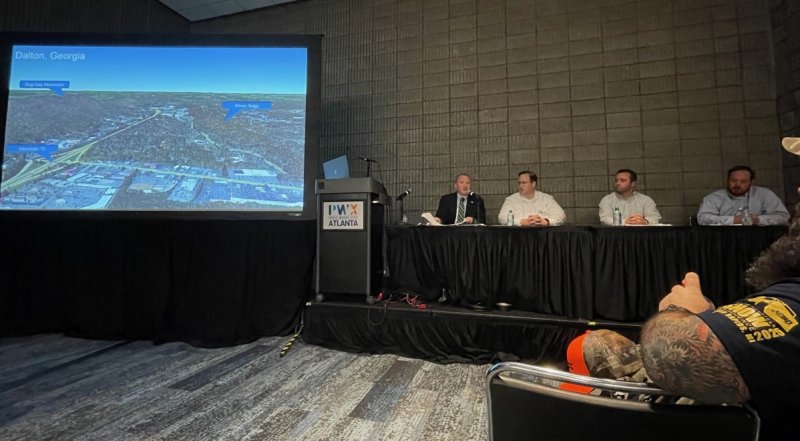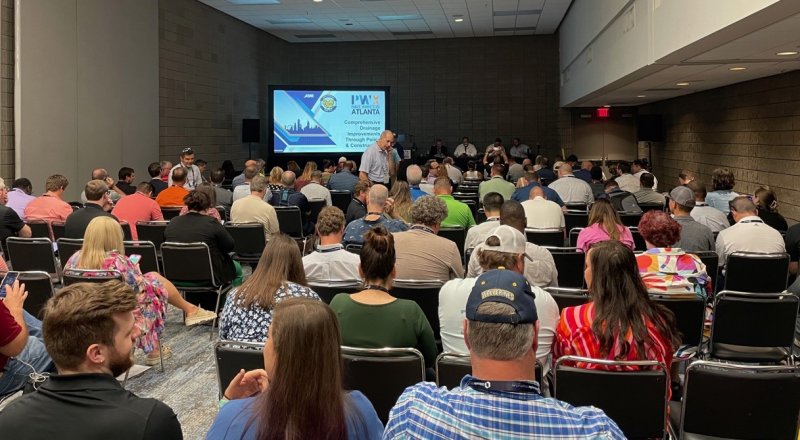Dalton Officials Teach Stormwater Planning At National Public Works Conference
 Thursday, September 12th, 2024
Thursday, September 12th, 2024
Over the past five years, the City of Dalton has been charting a groundbreaking course with the development and execution of a 21st century stormwater management plan. Earlier this week, members of the City's Public Works team presented that plan to communities from across the country at the American Public Works Association's (APWA) Public Works Expo. The conference, which is referred to as "PWX", brings together hundreds of public works professionals from across the country. This year, it is being held in Atlanta.
"It was sort of a celebration moment for us to get a chance to take a deep breath and think about the progress we have made," said Andrew Parker, Dalton's City Administrator and one of the speakers who presented on Tuesday. "We still feel like we’re very much still in progress with continuing to execute that plan, but in talking to that group it became very much apparent that really we’ve come a long way in these five years."
Caption: (from left to right) City Administrator Andrew Parker, Arcadis engineer Richard Greuel, and Public Works Project Manager Jackson Shepard, and Director Chad Townsend speak on a panel at PWX
The City of Dalton grew for more than 150 years without a plan to address the stormwater runoff and flooding concerns caused by development. In 2006, the federal government mandated that local governments must have a stormwater management plan and the City of Dalton spent more than a decade playing catch up. In 2020, the City contracted with the Arcadis engineering firm to perform a comprehensive study of Dalton's stormwater issues and develop a plan to address them. The firm suggested more than 30 projects, and the City has been working on them ever since. In addition to the actual physical work required to construct the projects, the City also required a lot of work on red tape. Many of the projects required work both in the right of way and also private property and also required the acquisition of property. That required changes to the City's code of ordinances to allow that type of work to take place.
 "We sort of walked the (PWX) group through the evolution of the City’s stormwater program," Parker said. "We had to take several steps to get where we are today... so we talked about policy changes that had to occur from an ordinance standpoint and we talked about how we put together a catalog of our known issues throughout the City."
"We sort of walked the (PWX) group through the evolution of the City’s stormwater program," Parker said. "We had to take several steps to get where we are today... so we talked about policy changes that had to occur from an ordinance standpoint and we talked about how we put together a catalog of our known issues throughout the City."
The City of Dalton is only approximately a third of the way into executing the package of 30+ projects in the stormwater management plan. Parker, Public Works Director Chad Townsend, and Project Manager Jackson Shepard focused their presentation on the four phases of the Walnut North Drainage Improvements Project. The first two phases of the project have been completed, with the installation of a natural stormwater structure in the West Hill Cemetery and the installation of a stormwater bypass on Ridge Street. The next two phases are ready to begin.
Caption: A group of public works professionals from across the United States listen to the City of Dalton's presentation at PWX
"We highlighted that because we had a little bit of every type of infrastructure improvement that can be offered in these stormwater projects," Parker said. "So, in talking about that project we were able to talk about several different types of stormwater improvement projects and what it took to plan that, what it took to get public buy in for that, what it took to design it, what it took to construct it, and what it will take to maintain it."
Parker said that the APWA selected the Dalton team to present during the "stormwater summit" at PWX because Dalton is one of the first cities to create and execute this type of stormwater plan. And even though Dalton is a relatively small city when compared with some of the metropolitan areas represented at PWX, Dalton's plan can work for them, too.
"So many communities are wrestling with this major problem that costs a lot to repair and philosophically, traditionally, these solutions are.... a little outside of the box for local governments because typically local governments are thinking within the confines of the property they own and the right of ways that they own," Parker said. "So, even though we’re a small city relative to a lot of those that were in attendance, these same concepts can be upscaled and the process in terms of planning, allocating funds, designing and constructing and maintaining them... that same process can be replicated regardless of whether you’re a small city or a big city."
